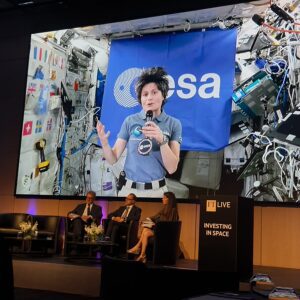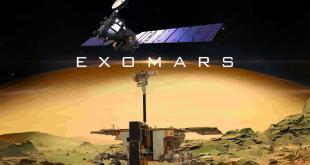by Christophe Bosquillon

The Financial Times Live conference on Investing in Space took place in London, digitally and in person, on the 8th and 9th of June 2022. The agenda tackled space investing from a comprehensive perspective upfront: the dynamics of geopolitics, Environment, Sustainability, and corporate Governance (ESG), security and safety, as drivers for investing in the far-reaching domain of space. If the ‘S’ in ESG stands for Sustainability and boils down to ‘people, planet, profit’, ‘planet’ is expanded from Earth to orbit and the whole of the Earth-space ecosystem.
The geopolitical factor
With space as a far-reaching domain entangled with Earth issues across many industries, geopolitics affect how global alliances deal with security in orbit and beyond, and how collaborative governance motivates investment: from connectivity to Earth observation to crowded orbits and debris, to energy, space traffic management, space exploration and resources utilization. While NASA played down the prospect of a breakdown in its relationship with Roscosmos, it restated that the ISS remains due to run its course as a collaborative program with Russia till 2030, at which time NASA will become a lessee on commercial space stations.
Geopolitical entanglements and their consequences being nothing new, investors sentiment takes the new normal in stride, noting that war has triggered interest to start looking at more private sectors options. Countries realize they need to not only maintain but protect their space assets from hostile military forces taking them out. While some funds had made it a political statement to decline investing in anything remotely connected to the military, it turns out that war has investors looking again at defense as a sustainable sector. In addition to the fact that military growth helps mature dual technology that is then transferrable to the civilian side, the role of the government as lead investor and anchor customer is seen as a positive factor to encourage the private sector to follow suit.
Space is part of a new Silk Road to instrumentalize the High Frontier and establish hegemony in the global political and economic order on Earth.
As China builds a space station in lower orbit, its model remains to combine commercial space capabilities with PLA military capabilities and fast track dual technologies, leveraging an increasing workforce together with strong national pride and global prestige. China announced the ILRS with Russia on the Moon, and space is part of its new Silk Road to instrumentalize the High Frontier and establish hegemony in the global political and economic order on Earth, in orbit, and beyond: this alone should push Western governments and private sector to step up quickly. So, not only does the geopolitical factor not stall investors’ interest, and war is not an obstacle nor an impediment, but it is triggering a renaissance in space investing: defense, dual tech, cislunar transportation, and even an emerging appetite in space resources utilization, as territories beyond Earth become new stakes in a context of re-bipolarization of world affairs.
Meanwhile, investors encourage companies to depart from a decades-old trend of offshoring suppliers and to relocate value chains back to onshore strongholds of national and regional autonomy. This is a view on sovereignty particularly articulated in Europe. We were also reminded by the United Nations Office for Outer Space Affairs (UNOOSA) that, while the United Nations Committee on the Peaceful Uses of Outer Space (COPUOS) deals with safety and sustainability in space, arms control is covered by a UN separate ‘Open Ended Working Group on Reducing Space Threats’, initiated in first quarter 2022. Ukraine and Taiwan are acknowledged as factors making an agreement on military space threats unlikely for the time being. Inversely, for COPUOS it is more hopeful to reach a fast agreement on space debris, which is an existential concern in orbit for all actors. And while it is clear that life on Earth and commercialization in space are directly affected by space sustainability and militarization, the need for more civilian cooperation activities is acknowledged, including the private sector and all civil society stakeholders.
A Midsummer UK-EC Night’s Dream? No, Minister.
The European Union Agency for the Space Programme (EUSPA, based in Prague) is active in domains concerning the EU space industry that have a strong Earth Observation (EO), digital transformation, and data economy component: it’s involved in the downstream industry of development for Galileo, EGNOS and Copernicus; it leverages Horizon Europe, and it is involved in other EU funding and innovative procurement mechanisms. Thus, for the UK being terminated from its participation in Copernicus and being potentially excluded from the Horizon Europe program is a rather lingering concern.
Such decision is in the hands of Brussels, which is not so open to the dialogue (apparently the UK Minister for Science, Research and Innovation George Freeman, with whom it’s possible to empathize, had just been refused a meeting with the European Commission for the 6th time). So, what if the UK and the EC/EU do not settle on Horizon and Copernicus? The Minister is ambitious, and he envisions a return to exponential growth through space markets no matter what the EU will say. He clearly stated that he’s still hopeful for a phone call from Brussels, but if that was indefinitely put on hold, then he will have to move to (a yet undisclosed) Plan B. It is possible to imagine that, since the UK government has made strategic investments such as OneWeb, the industry will be able, willing, and ready to proceed. This EC blockade, if painful, might be a blessing in disguise for the UK’s strategic autonomy and commercial competitiveness over the full Earth Observation value chain, while it will make an already strong American embrace even stronger.
On the other side, ESA is keen to keep the dialogue open with the UK. ESA’s Directo General Josef Aschbacher did underline that Copernicus is only 1% of its budget, and Earth Observation (EO) is in the low 2-digits, alas there is a lot of room for a UK-ESA cooperation. This is almost a case study of the impact of geopolitical decisions on scientific research and sustainable space within Europe: ESA requires a budget increase from its members-states, alas wants the UK in, and the UK wants to hang on as much as possible to its EO value chain. Therefore, they will strike a deal.
Minister George Freeman’s intervention was interesting also from another geopolitical standpoint, which touches upon security and power games between nations. The Minister hinted to the willingness of the UK to act as “rule keepers” and diplomatic hub in EO and space affairs. However, there is a hint of naivety in all this. The UN channels are still the preferred platform for international negotiations and settlements. Should one specific global space governance organization be created, it would be supra-national, not relying over one particular nation-state, especially one which is obviously a direct surrogate to a major power. Decisions makers in Beijing and Moscow answer only to calls from Washington when it comes to world class issues, and it would be preposterous from any pan-European power to even start to dream that they could be a pivotal center of strategic dominance vis-à-vis with China and Russia (and let’s not forget that India and other countries are rising powers too). We’ve reached a dangerous tipping point where China and Russia behave as if they can say “no” to the West simply because they think they can, and they think they should. This is a rather complicated issue of (un)balance of power. When walking on eggs, tread with caution.
The Minister hinted to the willingness of the UK to act as “rule keepers” and diplomatic hub in EO and space affairs. However, there is a hint of naivety in all this.
What old policy can do to help the space domain?
The development of a healthy and truly sustainable space economy lies on approaching growth in a humanely sensitive and responsible manner, restoring the Earth-space ecosystem balance rather than exclusively pursuing profits. Digital transformations and data economy are key drivers of governance and sustainability, thus relentless reduction of the cost of access to space is key to a sustainable expansion to the whole space domain. There’s no way to reach Net Zero by mid-century unless we industrialize space, which itself means pursuing three main goals: space based solar power; factories in orbit (or on the Moon); space exploration and resource extraction on the Moon and asteroids.
Current Anglo-American dominance and the challenge posed by China and Russia as peer competitors being a given, COPUOS remains a preferred avenue of negotiation and settlement, albeit protracted: accelerated involvement is required from the whole of civil society private stakeholders, across the whole space domain, down to Earth.
Bumps in the road of generating revenues from space domain investments
While the year 2021 saw more investments in the space domain than in the whole previous decade, the sub-plot of Special Purpose Acquisition Companies SPACs and their proliferation will reckon with its own sustainability. With recession likely, more crisis and wars ahead, natural selection and stricter due diligence, we are likely looking at a probable investment winter. It is understood among investors that this will trigger what is customarily called a “flight to quality”, as the most resilient companies will be accessible at more reasonable valuations. And this in addition to the fact that an investment winter is often the best time for thrifty companies to steadily build up and develop, in order to hit the ground running and thrive when good times return. Investors engaged on the long term are less concerned.
Are space development models inclusive enough for Small and Medium sized Enterprises (SMEs)? The UK and the European Union are still dangerously lagging in growth capital, which undermines their geopolitical leverage and governance impact globally. Investors and industry are not communicating enough yet over space as a domain (and not a ‘sector’) and seem to not have a clear demand-oriented value chain vision. If they would, this would demonstrate a sustainable competitive edge rather than simply asserting a sort of supply-side hype. Another issue was the fact that a large majority of investors remains unconcerned by and disengaged from ESG issues (see here for a more in-depth discussion on the Sustainability issue).
Perhaps in the space domain we should link ESG with the ability to solve problems in accountable ways that are verifiable by validated and immutable data, rather than good intentions and subjective scores. It is useful to remind again that investment in the space domain should be instrumental to solve sustainability problems on Earth: connectivity and NPT, Earth observation data, energy, industrial pollution, life sciences, circular economy, etc. (Regardless of space, a realist assessment published in 2021 by Tariq Fancy, former sustainable investing chief at Blackrock, could inform better on ESG investment shortcomings.
The world is not enough
Live from the ISS, Samantha Cristoforetti, ESA astronaut, sent us reaching to the stars on behalf of humanity. The FT (Nikkei Inc media group) event did have a fair take on Japan and Asia space too. Canada, UAE, South-African space agencies were represented. There is a need for a 3rd day with more global space actors and investors though. Granted, the space domain is dominated by Anglo-American actors, while Europe keeps building capacity. However, if we’re going to have that planetary conversation about recognizing and incentivizing responsible behavior across the space domain, international cooperation matters. Yet, in the end, it is only national implementation that does the job: we need Africa, Russia, China, India, ASEAN, S-Korea, Japan, LatAm, everyone, at the table. Make it happen, please.

Currently based in Europe, Christophe Bosquillon operated globally out of the Indo-Pacific for the best part of the past decades. With a techno-economic background in non-space industries, as well as international affairs and foreign direct investment, Chris maintains a long-standing interest in old and new space, also from a security and policy standpoint. A decade ago, he developed a ‘Legal Hacker’ interest in the digital transformation governance field, data rights, computational law, and composable governance. Founder of Autonomous Space Futures Ltd., Chris, an experienced corporate boss and business owner, focuses on solutions to develop business cases in and beyond orbit: value propositions TRL-realistic over time, commercially credible, financially sustainable, legally implementable ; optimizing open data and registration in a context of adaptive governance for peaceful and sustainable space activities. While fixing the investee-investors relationship, value creation, and funding processes, Chris currently works out on the steep learning curve of space law, governance, and diplomacy.
 SpaceWatch.Global An independent perspective on space
SpaceWatch.Global An independent perspective on space




